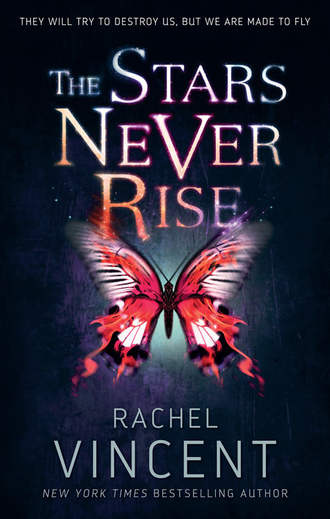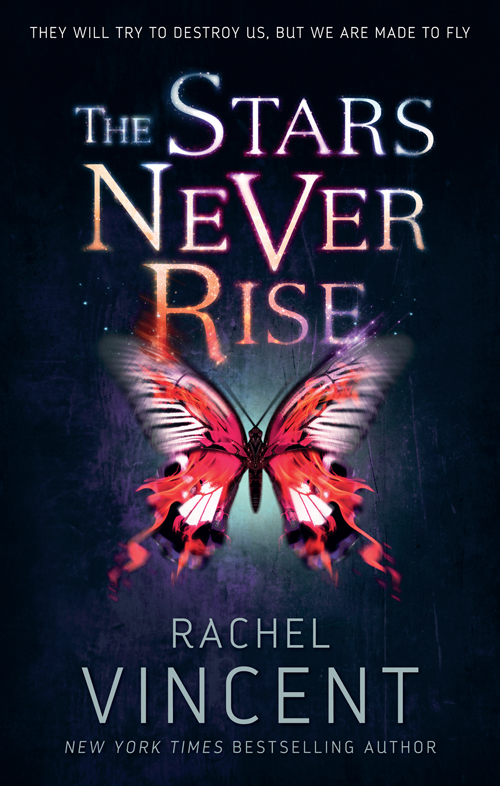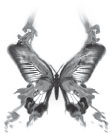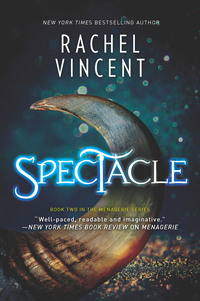
Полная версия
The Stars Never Rise


Praise for the novels of New York Times bestselling author
RACHEL
VINCENT
‘I liked the character and loved the action. I look
forward to reading the next book in the series.’
Charlaine Harris
‘Vincent is a welcome addition to the genre!’
Kelley Armstrong
‘Compelling and edgy, dark and evocative, Stray is a must read! I loved it from beginning to end.’ Gena Showalter
‘I had trouble putting this book down. Every time
I said I was going to read just one more chapter,
I’d find myself three chapters later.’
Bitten by Books on Stray
‘Vincent continues to impress with the freshness of her
approach and voice. Action and intrigue abound.’
RT Book Reviews
RACHEL VINCENT is the New York Times bestselling author of many books for adults and for teens, including the Shifters, Unbound, and Soul Screamer series. A resident of Oklahoma, she has two teenagers, two cats and a BA in English, each of which contributes in some way to every book she writes. When she’s not working, Rachel can be found curled up with a book or watching movies and playing video games with her husband.
Visit Rachel online at
rachelvincent.com
Follow Rachel Vincent on



www.miraink.co.uk
To my husband, who helped me brainstorm this project in various versions for two full years before I even told my agent about it. Thanks for all the plotting sessions, for the sketches you drew of my concepts and for your endless patience. You’re the best. No, really.
ACKNOWLEDGEMENTS
Thanks to my amazing agent, Merrilee Heifetz, who makes things happen.
Thanks to my new editor, Wendy Loggia at Delacorte Press, who championed this book all the way into print.
Thanks, as always, to my critique partner, Rinda Elliott, who saw several versions of the beginning of this book, only a few passages of which made it into the final text. Your input is invaluable.
Many thanks to the awesome Rachel Clarke for a critical early read.
A big thank-you to Jennifer Lynn Barnes, for Panera writing days, company and advice. There is no scene that cannot be conquered with a little caffeine and a bowl of soup.
And finally, thanks to everyone at Random House who has worked on The Stars Never Rise. Your dedication and experience are greatly appreciated.
And finally, thanks to everyone who has worked on The Stars Never Rise. Your dedication and experience are greatly appreciated. Thanks so much to Angharad Kowal, my UK agent, and to Anna Baggaley and Mira Ink, for making The Stars Never Rise available in the UK.
Table of Contents
Cover
Praise
About the Author
Title Page
Dedication
ACKNOWLEDGEMENTS
ONE
TWO
THREE
FOUR
FIVE
SIX
SEVEN
EIGHT
NINE
TEN
ELEVEN
TWELVE
THIRTEEN
FOURTEEN
FIFTEEN
SIXTEEN
SEVENTEEN
EIGHTEEN
NINETEEN
TWENTY
TWENTY-ONE
TWENTY-TWO
Endpage
Copyright

ONE
There’s never a good time of day to cross town with a bag full of stolen goods, but of all the possibilities, five a.m. was the hour best suited to that particular sin.
Five a.m. and I were well acquainted.
“Nina, hurry!” Marta whispered, glancing over my shoulder at the cold, dark backyard, but she probably couldn’t see much of the neat lawn beyond the rectangle of light shining through the open screen door. “Mrs. Turner’s already up.” She wiped flour from one hand with a rag, then flipped the lock and pushed the door open slowly so it wouldn’t squeal and give us away.
“Sorry. Mr. Howard locked his back gate, so I had to go the long way.” My teeth still chattering, I stepped into the Turners’ warm kitchen and handed Marta the garment bag I’d carried folded over my right arm. The plastic was freezing from my predawn trek. Marta would have to hang the uniforms near a heater vent, or Sarah Turner would figure out that her school clothes hadn’t spent the night in her warm house, and I’d be out of a job. Again.
I couldn’t afford to lose this one.
Marta set her rag on the butcher-block kitchen island, where she’d been cutting out homemade biscuits, then hooked the hangers—I’d bundled them just like the dry cleaner would have—over the door to a formal dining room half the size of my house. I’d been in there once. The Turners’ cloth napkins probably cost more than my whole wardrobe.
Mr. Turner owned the factory that made the Church cassocks—official robes—for most of the region. I found that ironic, considering the illicit work I was doing on his daughter’s clothes, but I refused to feel guilty. The Turners’ monthly tithe would feed my whole family for a year.
“They’re all here?” Marta unzipped the garment bag to inspect my work.
“Same as always. Five blouses, five pairs of slacks, all starched and pressed. That raspberry stain came out too.” I picked up the sleeve of the first blouse to show her the bright white cuff, and when she bent to study the material, I took a can of beef stew from the shelf at my back and slid it into the pocket of my oversized jacket.
“Good. Here’s next week’s batch.” Marta straightened and gestured to a bulging brown paper bag sitting on the tile countertop. “Sarah cut herself and bled on one of them….” She opened the bag and lifted the stained tail of a blouse at the top of the pile. “I told her blood won’t come out of white cotton, so she’s already replaced it, which means you’re welcome to keep this one. The stain’ll never show with it tucked in.”
“Thanks.” I mentally added the secondhand blouse to the small collection of school uniforms my sister and I actually owned.
Marta rolled down the top of the bag and shoved it at me, and when she turned to open a drawer beneath the counter, I slid another can of stew into my other pocket. My coat hung evenly now, and the weight of real food was reassuring.
“And here’s your cash.” She pressed a five and a ten from the drawer into my hand, then ushered me out the back door.
I grinned in spite of the cold as I jogged down the steps, then onto the Turners’ manicured back lawn, running my thumb over the sacred flames printed in the center of the worn, faded bills. That fifteen dollars put me within ten of paying this month’s electric bill, which wasn’t due for another week and might actually be paid on time, thanks to my arrangement with Marta.
Every week, Mrs. Turner gave her housekeeper twenty dollars to have Sarah’s school uniforms cleaned and pressed. Every Monday, Marta kept five of those dollars for herself and gave the rest to me, along with that week’s dirty clothes. Sarah had two full sets of school clothes. As long as she got five clean uniforms every Monday morning, Marta didn’t care what my sister and I did with them until then. So we laundered them on Monday afternoon, wore them throughout the week to supplement our own hand-me-down, piecemeal collection of school clothes, then laundered them again over the weekend in time to deliver them fresh and clean on Monday morning.
Marta got a little pocket money. Sarah got clean uniforms. My sister and I got cash we desperately needed, as well as the use of clothes nice enough to keep the sisters from investigating our home life.
So what if deception was a sin? You can’t get convicted if you don’t get caught.
Shivering again, I crept around square hedges, careful not to step on the layer of white rocks in the empty flower bed, then into the yard next door. The Turners’ house was only three-quarters of a mile from mine, but at 5:50 in the morning, with the temperature near freezing, that felt like the longest three-quarters of a mile in the world. Especially considering that from Sarah’s backyard, closer to the center of town, the town wall wasn’t even visible.
From my backyard, that hulking, razor-wire-topped steel wall was the primary landmark.
I cut through several backyards and a small alley on the way home, and to avoid Mr. Howard’s locked gate, I had to detour onto Third Street, where most of the store windows were still dark, the parking lots empty. The exception was the Grab-n-Go, which stayed open twenty-four hours a day. As I skirted the brightly lit parking lot and gas pumps, I glanced through the glass wall of the store at the huge wall-mounted television dutifully broadcasting the news, as required by the Church during all business hours. In the interest of public awareness, of course.
Willful ignorance was a sin.
The Grab-n-Go was playing the national news feed. The only other choice was the local news, which repeated on a much shorter, more annoying loop. Still, I kind of felt sorry for the night clerk, sentenced to listen to the same headlines repeated hour after hour, with few customers to break the monotony.
I couldn’t actually hear the newscaster, in her purple Church cassock with the broad, gold-embroidered cuffs, but I could tell what she was saying because in the absence of actual breaking news, newscasters all said the same things. Tithes are up. Reports of demonic possession are at an all-time low. Our citizens are safe inside their steel cages—I mean, walls. The battle still rages overseas and degenerates still roam the badlands, but the Church is vigilant, both at home and abroad, for your safety.
It had been more than a century since the Unified Church and its army of exorcists wiped the bulk of the great demon horde from the face of the earth—the face of America, anyway—yet the headlines never changed.
I stuck to the shadows, walking along the windowless side of the convenience store. Old posters tacked to the brick wall read “Put your talents to work for your country—consider serving the Church!” and “Report suspicions of possession—the Church needs your eyes and ears!” and “Tithe generously! Every dime makes a difference!”
That last one was especially funny. As if tithing were optional. My mom owed several thousand in overdue tithes, from back when she was still working, and if the Church came looking for it, we were screwed.
Behind the store, I rolled the top of the bag tighter to protect the clothes inside, then tossed my bundle over the six-foot chain-link fence stretched across the width of the alley, shielding the Grab-n-Go’s industrial trash bin from casual dumping by the adjoining neighborhood. My neighborhood.
The bag landed with the crunch of gravel and the crinkle of thick paper. I had the toe of one sneaker wedged into the chain-link, my fingers already curled around cold metal, when I heard a rustle from the deep shadows at the other end of the alley. I froze, listening. Something scraped concrete in the darkness.
I let go of the fence and took a step back, my heart thudding in my ears.
Dog. But it’d have to be a big one.
Bum. But there weren’t many of those anymore—the Church had been taking them off the street and conscripting them into service for more than a decade.
Psycho. There were still plenty of those, and my mom seemed to know them all. But not-quite six in the morning was early, even for most psychos.
Something shuffled closer on the other side of the fence, and I saw movement in the shadows. My fists clenched and unclenched. My pulse whooshed in my ears, and I regretted throwing Sarah’s clothes over the fence. I regretted not taking the even longer way home, through the park. I regretted having a mother who couldn’t shake off chemical oblivion in order to feed and clothe her children.
The thing shuffled forward again, and two pinpoints of light appeared in the darkness, bright and steady. Then they disappeared. Then reappeared.
Something was blinking. Watching me.
Shit! I glanced at the paper bag through the fence, clearly visible in the moonlight, just feet from deep shadows cast by the building. Deep shadows hiding … a dog.
It’s just a dog…. It had to be. People’s eyes don’t shine in the dark.
You know whose eyes do shine in the dark, Nina? Degenerates’.
My pulse spiked. There hadn’t been a confirmed possession in New Temperance in years, and the last time a degenerate made it over the town wall, I was in the first grade.
It’s a dog.
No stray dog was going to scare me away from a bag of uniforms that cost more than I could make in six months of washing and pressing them. That wouldn’t just be the end of my work for the Turners, it would be the end of Marta’s work for the Turners and the beginning of my conviction for the sin of stealing. Or falsehood. Or whatever they decided to call borrowing and laundering someone else’s clothes under false pretenses.
I stepped up to the chain-link, mentally berating myself for being such a coward. I was halfway up the fence when the shuffling started again, an uneven gait, as if the dog—or the shiny-eyed psycho?—was injured and dragging one foot. I could hear it breathing now, a rasping, whistling sound, not unlike my own ragged intake of air. I was breathing too fast.
My hands clenched the fence, and metal dug into my fingers. I froze, caught between fear and determination. Injured dogs don’t approach strangers unless they’re sick or hungry. It couldn’t get through the fence. But I needed those clothes!
One more shuffle-scrape on concrete and a shape appeared out of the shadows. My throat closed around a cry of terror.
Part human, part monster, the creature squatted, a tangle of knees and elbows, stringy muscles shifting beneath grayish skin. The limbs were too long and too thin, the angles too sharp. The eyes were too small, but they shone with colorless light that seemed to see deep inside me, as if it were looking for something I wasn’t even sure I had.
Degenerate.
It wasn’t possible. I’d seen them on the news, but never in person. Never this close. Never in New Temperance …
It was bald, with cheekbones so sharp they should have sliced through skin, and ears pointy on both the tops and the lobes. And—most disturbing of all—it was female. Sagging, grayish breasts swung beneath torn scraps of cloth that were once a dress. Or maybe a bathrobe.
The monster roared, and its mouth opened too wide, its jaws unhinging with a gristly pop I could hardly hear over the horrific screech that made my ears ring and my eyes swim in tears. It watched me, and I stared back, frozen in terror.
Run!
No, don’t run. Back away slowly…. Maybe degenerates were like dogs, and if I ran, it would chase me.
I pulled my right shoe from the fence and slowly, carefully lowered myself, without looking away from the monster. It shuffled closer in its eerily agile squat, and I fumbled for a blind foothold in the metal as I sucked in air and spat it out too quickly to really be considered breathing.
The degenerate was six feet from the fence when I reached the ground and began slowly backing away, the uniforms forgotten. My hands were open, my legs bent, ready to run.
The monster squatted lower, impossibly low, and tensed all over, watching me like a cat about to pounce. Then it sprang at me in one powerful, evil-frog leap.
I screamed and backpedaled. The monster crashed into the chain-link fence. The metal clanked and shook, but held. The demon crashed to the ground, her nose smashed and bleeding, yet she still eyed me with hunger like I’d never seen before. She was up in an instant, pacing on her side of the fence on filthy hands and feet, her knees sticking up at odd angles. She stared through the metal diamonds at me with bright, colorless eyes, and I backed up until I hit the trash bin.
A low, rattling keening began deep in her throat when I started edging around the large bin, my palms flat against the cold, flaking metal at my back. The degenerate blinked at me, then glanced at the top of the fence in a bizarre, jerky movement. I realized what she intended an instant before she squatted, then leapt straight into the air.
Metal squealed when her knobby fingers caught in the top of the chain-link and her bare, filthy toes scrambled for purchase lower on the fence. For a moment, she balanced there like a monstrous cat on a wall.
My heart racing, I backed away quickly, afraid to let her out of my sight. She leapt again. I heard a visceral snap when she landed on the concrete just yards from me, her deformed right foot bent at a horrible angle. She lurched for me, in spite of the broken bone, and I screeched, scrambling backward.
The demon lunged again, clawlike fingers grasping at my sleeve. I kicked her hand away, but she was there again, and again I retreated until I hit the trash bin and realized I’d gotten turned around in the dark, and in my own fear. I was trapped between the demon and the fence.
She lurched forward and grabbed my ankle. The earth slipped out from under me, and my head cracked against the industrial bin. My ears rang with the clang of metal, and I hit the ground hard enough to bruise my tailbone. My head swam. Fear burned like fire in my veins.
The degenerate loomed over me in her creepy half crouch, rank breath rolling over my face as she leaned closer, her mouth open, gaping, ready for a bite.
“Over here!” someone shouted, and the degenerate twisted toward the fence, snarling, drool dripping from her rotting teeth and down her chin. Over her bony shoulder, I saw a shadowy form beyond the chain-link. A boy—or a man?—in dark clothes, his pale face half hidden by a hood.
She snarled at him again, one clawed hand still tight around my ankle, and I saw my chance. I kicked her in the chest with my free foot, and she fell backward, claws shredding the hem of my jeans.
“You don’t want her. Come get me!” Metal clinked and rattled, and I realized the boy was climbing the fence. And he was fast.
I crawled away, trying to get to my feet, but she grabbed my ankle and gave it a brutal tug. I fell flat on my stomach, then rolled over as she pulled and I kicked. My foot slammed into her belly, and her shoulder, and her neck, but she kept pulling until she was all I could see and hear and smell.
Concrete scraped my bare back when my coat and shirt rode up beneath me. I threw my hands up and my palms slammed into the degenerate’s collarbones. I pushed, holding her off me with terror-fueled strength. The chain-link fence rattled and squealed on my right. The beast snarled over me, deformed jaws snapping inches from my nose as my arms began to give, my elbows bending beneath the strain of her inhuman strength.
“Hey!” the boy shouted, and a thud told me he’d landed on my side of the fence, just feet away. His arm blurred through the shadows, and the degenerate snarled as it was hauled off me.
I scrambled backward, and the seat of my jeans dragged on the ground until my spine hit the trash bin again. My hands shook. My back burned, the flesh scraped raw by the concrete.
A bright flash of light half blinded me, and when my vision returned a second later, I could see only shadows in dark relief against the even darker alley. One of those shadows stood over the other, malformed shape, his hand against her bony sternum, both glowing with the last of that strange light.
What the hell …?
An exorcist.
An exorcist in a hoodie. Where were his long black cassock, his cross, and his holy water? Where were his formal silence and grave demeanor?
As I watched, stunned, that light faded, and slowly, slowly, the rest of the alley came into focus.
The boy stood and wiped his hands on his pants, his hood still hiding half his face. The degenerate lay unmoving on the ground, no less gruesome in death than she’d been in life, and now that the violent flash had receded from my vision, I realized the alley was growing lighter. The sun was rising.
I pushed myself to my feet while the boy watched me with eyes I couldn’t see in the shadow of his hood. “I … I …,” I stammered, but nothing intelligent followed.
“Holy hellfire!”
We turned to see the Grab-n-Go night clerk standing at the end of the alley, backlit by the parking lot lights, staring at us both. In the distance, a siren wailed, and I realized three things at once.
One: The clerk had reported the disturbance, and the Church was on its way.
Two: He hadn’t realized this was more than a scuffle in an alley until he saw the dead degenerate.
Three: I was still in possession of borrowed/stolen clothes, and since I was the victim of the first degenerate attack in New Temperance in the last decade, the Church would want to talk to my mom.
I couldn’t let that happen.
“Is that …?” the night clerk stared at the degenerate, taking in her elongated limbs and deformed jaw. His gaze rose to my face and he squinted into the shadows. He couldn’t see me clearly but was obviously too scared to come any closer. His focus shifted to the boy standing over the degenerate, and his eyes narrowed even more. “Are you …?”
“Run.” The boy didn’t shout. He didn’t make any threatening gestures. He just gave an order in a firm voice lent authority by the fact that he was standing over the corpse of a degenerate.
The clerk blinked. Then he turned and fled.
“You okay?” The boy shoved his hands into the pockets of his black hoodie. And he was a boy. My age. Maybe a little older. I still couldn’t see his eyes, but I could see his cheek. It was smooth and unscarred. No Church brand. No sacred flames.
What kind of exorcist has smooth cheeks and wears a hoodie?
“That’s a degenerate,” I said, and it only vaguely occurred to me that I was stating the obvious. I was just attacked by a demon. I couldn’t quite wrap my head around it. How had it gotten into town?
“Yeah. Is there any way I can convince you to maybe … not tell anyone what I did?”
I frowned. Why wouldn’t he want credit for killing a degenerate? How could he be an exorcist—obviously trained by the Church—yet bear no brand and wear no cassock?
“Please. Just … don’t mention me in your statement, okay?” He glanced to the east, and shadows receded from his jaw, which was square and kind of stubbly. The sirens were getting louder. I could see the flash of their lights in the distance, and the sky seemed to get lighter with every second.









